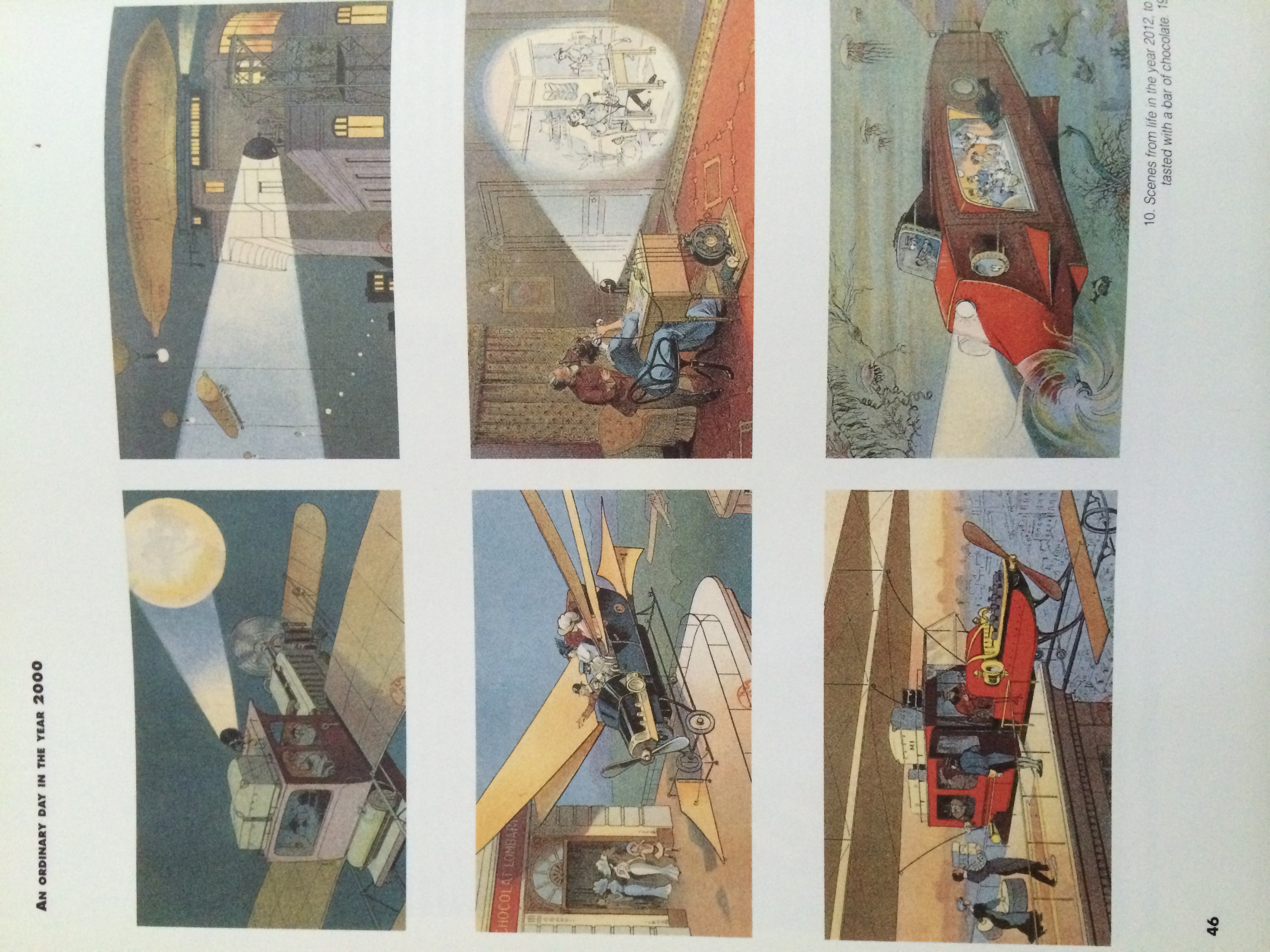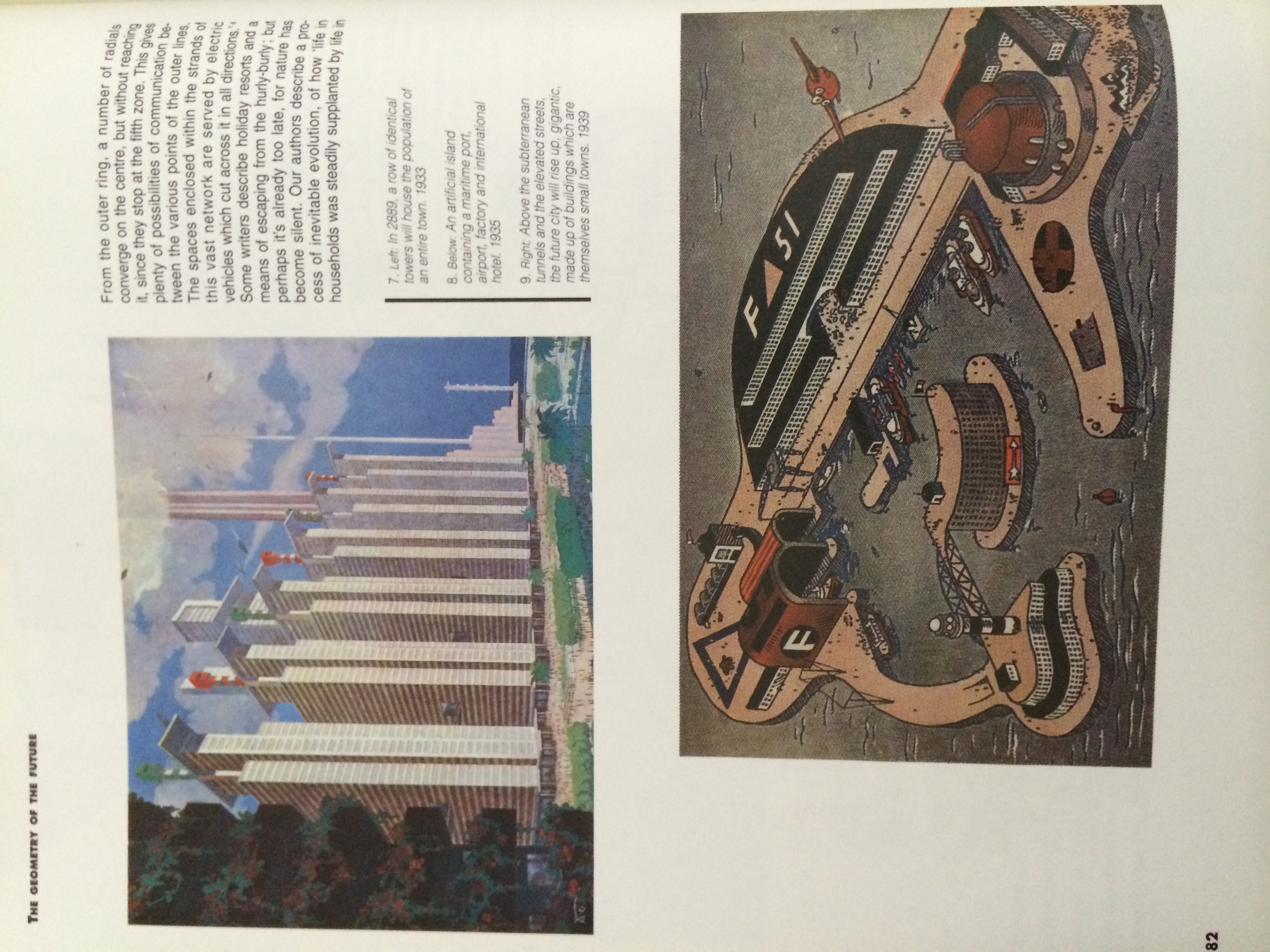One of my favorite random coffee table books is “The History of the Future,” an illustrated guide to how the people of the past imagined our future, written and curated by Christophe Canto and Odile Faliu in 1993. Flipping through the pages usually leaves me with a two thoughts – what new futures have we created since the year 2000, and what is our next new reference point for the distant but still conceivable future?
It's a wonderful read (if you can find it) and I've included a short photo set of some of my favorite images from the collection to give you an idea of whats inside,
“The year 2000 provided an ideal reassurance for the aspirations of the new middle class; they would have appreciated having somebody else to take care of the important things in life, orchestrating their fate and leaving them to worry only about the incidentals.”
The first chapter of the book is titled “An Ordinary Day In The Year 2000,” which is aptly named – for over a hundred years the year 2000 was somewhat of a classic milestone for predictors of the future and a relevant reference point for the setting of dystopian fictions that extrapolated the knowledge of the time into the foreseeable future.
As the date approached in the late 1990's, we actually began to muse less about how life would be different after we crossed the threshold. That is unless one of those doomsday predictions like Y2K was going to take down all of society overnight. Note in the chart below the drop in “the year 2000” ngram score slightly before the year 2000 actually arrived, and its obvious decline after,
ngram of "the future" tappers off after the year 2000
A Post-2000 Addendum To The History of The Future
As we edged closer to the year 2000 and then into the new millennium, our visions of the future began to course correct from the predictions of the past and looked towards new milestones. To extend and add contrast to the image set from the 20th century looking to the 21st, I've begun to put together a new collection of our more recent fictions of the future. Like their predecessors they are often also a commentary on some aspect of our current age.
Note: There are some spoilers here...
The near future (2015 - 2099)
Many of the fictions for the near future deal with how our society will deal with the unintended repercussions of our newest and soon to be invented technologies..
In Black Mirror, brain implants are coming very soon,
they will change how and who can access our memories.
Minority Report, in 2054 precognition will arrest murderers before they kill.
Cyber brain implants and physical upgrades are a common theme in the not to distant future. Extrapolating on our now constant connectivity to the net, wearable technology like Google Glass, advancements in the fields of robotics and limb prostheses, the merging of human and machine is already happening and may be norm within a generation,
Ghost in the Shell SAC: By 2030 full cyborg bodies are commonplace,
immersive virtual spaces and artificial intelligence will be reality.
This will come along with new forms of addiction and illness.
In order to survive through the end of this century we'll likely need to overcome a few huge hurtles, such as pollution, disease, limited resources and access to the energy needed to power the technology of the future. If we do succeed, we may see the colonization of other planets in our solar system over the next 30-80 years,
Excavations of the Moon could provide the limitless clean HE3 energy we need in 2035..
but this process is only made cost effective by using a duped human clone workforce.
The alternative may be an unending scarcity and conflict aboard the Snowpiercer on an uninhabitable Earth by 2041.
Or maybe we'll be nearly extinct by incurable disease in 2027 like Children of Men.
Assuming we do make it, there's also the question of how technology and scarcity of resources will change the world politically and economically,
“When it gets down to it — talking trade balances here — once we’ve brain-drained all our technology into other countries, once things have evened out, they’re making cars in Bolivia and microwave ovens in Tadzhikistan and selling them here — once our edge in natural resources has been made irrelevant by giant Hong Kong ships and dirigibles that can ship North Dakota all the way to New Zealand for a nickel — once the Invisible Hand has taken all those historical inequities and smeared them out into a broad global layer of what a Pakistani brickmaker would consider to be prosperity — y’know what? There’s only four things we do better than anyone else
music, movies, microcode (software), high-speed pizza delivery.
The Deliverator used to make software. Still does, sometimes.”
How far into the future will we have pizza delivery?
2071 - Odd jobs and adventures for profit around the solar system in Cowboy Bebop.
In Star Trek we ditch greed and war only after making first contact in 2063.
Refuge aliens landing in District 9 may not be greeted with the same hospitality as Vulcans..
This century will also likely see the birth of new forms of life of our own creation, both biological and mechanical. Bio engineering is already a reality, though in its infancy and the long term reproductions have yet to play out in the mainstream. True artificial intelligence seems a little further off, however there is a lot of money going into it, along with the robotics to build the bodies for them to live in. Our dealings with new forms of sentient life who have vastly different conceptions of reality may not come from space but will be equally as foreign to our understanding. Will our robot children be slaves or equals in the future?
Humanoid AI made to look like and serve us may be second class citizens with limited rights.
Over 50 years after Asimov wrote I, Robot we still aren't sure if we can make AI that won't just kill us.
Humanity is the ultimate dream of the accidentally sentient Bicentennial Man.
The fuuuuuuuture (2100 and beyond)
“Nothing will change in the future: technology will advance, but we will still have the same political, moral, and ethical problems as today.”
What lies ahead in the next century and through to the end of this millennium for humanity? Like with illustrators and writers of the early 1900's, it can be difficult for modern day artists and scientists alike to accurately guess the specifics of the future so far out will be like without using current technology and society as a reference. What we can say over this long of a time period is that things are going to either get better, worse or stay somewhat the same.
In the category of things going horribly wrong we still typically have stories that focus on the potential longterm results of some continued destructive behavior such as anti-intellectualism or wastefulness,
The world of Idiocracy has a stupid 2505 civilization about die off.
In Wall-e the Earth is abandoned in 2105 due to overwhelming trash..
and by 2805 the human population is much rounder.
A total collapse of civilization is only one we're going out. In other scenarios we survive with our technology but get stuck losing our humanity along the way, becoming unrecognizable versions of ourselves, or enslaved by it,
The Hunger Games, the year 2108s favorite televised blood sport.
In 2167 Fringe science will remove emotion from our genes in favor of increased intelligence.
Hey these year 2199 (or later) tentacle creepers from The Matrix look familiar..
The world of the future might be a lot like the world today only more futuristic and possibly in space. Even as we replace parts of our body and surroundings with increased augmentations or travel the stars, our basic human needs, fears and pleasures will remain the same.. only in more futuristic and therefore totally strange ways..
A modern North Korean architect imagines a future that looks remarkably similar to our own future histories.
The Fututrama year 3000 has room for both one eyed mutants and Oktoberfest.
If the human race makes it to the year 3000 there's a good chance it's because we found a way to get off of this rock called Earth and into deep space colonization. However until we figure out a way to travel much faster than the speed of light, the practicality of sending anything other than generation ships or intelligent robots on these unfathomably long trips beyond our solar system seems impossible.
Slower than light generation ships from an overcrowded Earth carried pioneers to distant stars in FireFly by 2517.
In 2014 the new EmDrive could make these slow but very long journeys possible.
Whereas in The Stories of Ibis androids and AI become our longterm space legacy.
The Eve Online MMORPG takes place over 21,000 years in the future, far from Earth.
Dr Who and Rose visit the eventual natural end of the Earth in the year 5.5/apple/26.
The Next Milestones
The AFI 2008 top sci-fi movies, all made before 1992.
To try to find a starting point with my second question, I used ngrams with other noteworthy dates as charted below. If any, the year 2050 seemed to stand out as a next milestone, but even at its peak score it ranks way lower than Y2K. More remarkably I noticed that the ngram score of many of these also began to drastically drop off just before the year 2000 instead of increasing and continue to do so – are we writing less about the future than we did in the past?
After the year 2000 we see a drop in references to the future.
What are some possible reasons for this? One might be that we are busy trying to catch up to our own version of future. Just because the things imagined are now technically possible doesn't mean that it isn't a lot of work to actually make them a mass market reality. In the last 14 years we've had proliferation of access to some of the technological dreams predicted over the last 100 years including 3D printing, smart phones, tablets, household robotics and advances in medicine. Perhaps the ability to collect and parse huge amounts of data in real-time has drawn our attention to short term prediction instead. Along with this we've had major growing pains as a society and not just from the technology itself. Recent wars, terrorism and financial recession have a way of changing the topic to more immediate concerns. On the other hand we could just be spending too much of our time on the infinite cat project.
The LongNow project focuses on the next 10,000 years of human history.
Despite this trend of less writing about the next upcoming milestones, we're still working to guess what the world will be like when we get there. For more on this subject, over at FutureTimeline.net you can read a detailed, part fact, part fiction account of the first 200 years of this millennium and beyond based on their research and analysis of long term trends. Then for further inspiration visit the LongNow project, a organization founded in 01996 with the goal of encouraging very long term thinking for the survival of the human race over the next 10,000 years. And of course there's a reddit for Futurology if you want to discuss the topic further.






















